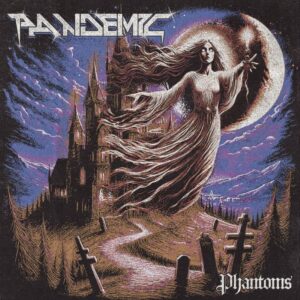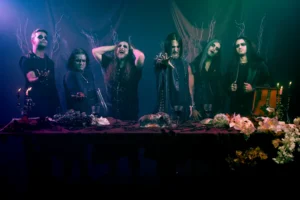SUICIDAL TENDENCIES Mike Muir Interview
•
January 7, 2011
Loud: Are you going to be working on any new material during those few months off the road?
Muir: Well, (it's) kind of a long story, but basically I'm having another kid and there's a few people that have family situations, surgeries, things like that, so we're taking a little bit of time off. Everybody's getting back acclimated with their families and things like that.
Loud: Do you think a new studio album from the band will see the light of day at some point in 2011?
Muir: That's an interesting question and at this time, you know, if you would have probably put it in terms of five or ten years ago or something we'd say we'd have two, two-and-a-half records that are done that we're eventually going to put out. The thing is now I don't know what actual form that we will put them out in and stuff. It's hard for me to answer questions, 'cause everything's kind of convoluted; it eventually gets to the point that it makes sense to some people and to the people that it does make sense to, it scares them. But you know, music is something that we've always said is not something to try to "fit in" in life, and my dad always said people who try to fit in are the ones who can't stand out. Every record we did, we didn't try to say, "Oh, this is what's going on, let's do it." A lot of times we took a lot of criticism or whatever, because we didn't do what other people were doing. (But) that wasn't really our concern and that's not why we started music. I really basically didn't like what other people were doing, so I wasn't going to mimic it, I was just going to do what I liked. I thought that I was maybe strange or different and so there probably wouldn't be too many people who liked it, but I wasn't really concerned about that. You know, when people do like it, it's good and when people like it for the reason why I like it - I think that's great. That's a whole different situation! I think for us, it's a lot of times, if you look back at what was big at certain times and someone put something on, and you laugh at it; "I can't believe people listened to that and liked it," you know? For us, we've got records that are getting up to 30 years old and we still think they're great and don't sound dated or old or (from) a time period. For us, that's! Music is more important that we do now, (from the perspective) that 10, 15 and 20 years from now, people that maybe aren't born or people hear it for the first time will go, "Wow, that's killer". I think a lot of times people panic and they try to rush out music because they're afraid that they won't have an audience anymore for whatever reason. Whether it's (because) stylistically it won't be any good and because the stuff that we have is not really stylistically in tune with what people are doing now, it doesn't really matter. So when it comes out, even though some of it may be five or seven years old when it comes out, it's going to be different than what people are listening to (at the moment). So we don't have that concern.
Loud: Obviously very popular and well-established bands such as METALLICA will still sell plenty of albums in the future, but how do you feel about the greatly decreased record sales meaning there will be few, if any new bands coming through and selling million albums and becoming that successful?
Muir: Well, what I think is that it theoretically keeps bands like METALLICA big. Just before we did the States tour we went to South America and we did a couple of really big festivals. Half the bands on there were bands that reformed within the past few years, who were big in the late '80s, early-to-middle '90s and stuff. There was a whole conversation with people about why that was and I said because there's no new bands that are coming in that are big, because records don't sell anymore. So they have to go back to the old bands that used to be big; they've stopped being big, but it's been so long that there's nobody else who's taken that place, because of the lack of sales. So, you know, in theory, it's unfortunate because I don't think there's going to be many new bands that are really going to really break through and do something, because there's just no! I wouldn't say incentive, but it's just real difficult, because how do you get people going over to someone's house to play something when there's 50 million things they can have in a second on the Internet? Why do you even check anything out, there's just too much crap, you know? (laughs) It's got to the point where it's background (music). They have the discussion with the Warped Tour in the States, how when it was big and how great it was. The problem is a lot of these people, their parents will take their kids there, but they're not going to any other shows. They're just going to that because it's an event and not going there because it's music - it's just an event. But they're not going to next month go to any clubs or anything else to check out any other music. The only show they go to is that big show that their parents feel safe to take them to or whatever, it's not motivating them to get into music and stuff. They're just going to kind of go and that's not what music was when I was young. It's a whole different generation, so I sound old (laughs).
Loud: (Laughs) Changing topics, SUICIDAL TENDENCIES were obviously at the forefront of fusing many different genres within the spectrum of heavy music. What's your view on the current state of heavy music, whereby more and more cross-pollination of genres is occurring?
Muir: When we did our first record, all the punk fanzines said it sucked and it was metal. Then all the metal fanzines and magazines that touched it said it sucked, (because) it was punk. Then we did our second record, all the punk fanzines which said the first one sucked and was metal (then) said it was a "punk rock classic" and "how could they come out with this metal crap now?" So we always kind of took the abuse and really weren't concerned about it and I think that bothered people even more. So I think what we did there wasn't really an audience for, (but) we didn't really care. A lot of the punk bands, when we started, they bragged about selling five thousand copies, you know? Which, I guess, nowadays you can brag about again, but back then that was nothing. There wasn't an audience there for it and we didn't really care. I think with music in that situation, now people are doing things more based on what they think people want to hear and where their audience is and that type of situation. You look at it with MySpace and all that with people, they start off and they've got a band name, a logo, they've got this and that and they don't even have a song, you know? (laughs) I think something's wrong with that, it's completely backwards. Everyone is like, "How do we get big?" And even with friends or family, people are like, can you ask him that? I'm like, "How do you get big?" Wow, why are you in a band? Do you want to be big or do you want to play music that no one else is doing, that you think is great and that you really love? Or do you want other people to love your music that you don't like yourself? It's a weird thing and you can't explain it to people if they don't get it.
Read the entire interview from Loud magazine.
Source: www.BlabberMouth.net
More results...





















